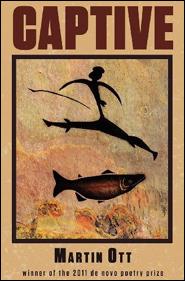about the author
Staff Book Reviewer Spencer Dew is the author of the novel Here Is How It Happens (Ampersand Books, 2013), the short story collection Songs of Insurgency (Vagabond Press, 2008), the chapbook Mont-Saint-Michel and Chartres (Another New Calligraphy, 2010), and the critical study Learning for Revolution: The Work of Kathy Acker (San Diego State University Press, 2011). His Web site is spencerdew.com.
To send your new book to decomP for possible review, see our guidelines. To find out what’s currently under consideration, visit our review queue.
∧
font size
∨

A Review of Captive
by Martin Ott
Spencer Dew
“An Army pal emails me from the Book of Numbers,” one poem repeats, a portentous line, like thunder. A child asks “Do earthquakes miss their / bones? Do bones have bones?” and the query likewise has the cold ring of an omen. Childhood games, in these pages, are often rehearsals for or safe plastic foreshadowings of war. Then there is war itself, a ubiquity. War engulfs. War strands. War hovers, heavy and dark, just above the heads of the people who pass through these poems: a threat, looming; a catastrophe, unable to be reversed. In one poem, “From the rubble, we ache to touch / the sky even as we bar our windows / and bolt our gates. And yet the unnamed / known hovers just beyond our reach.” “There are some things we cannot catch,” another poem states, putting plain that one such thing are airplanes, “aimed straight at our windows, jaws / collapsing like molten steel girders / or bodies thrown at us from the sky.”
Language itself has some root in violence, and Ott imagines how “The Tower of Babel collapsed / in a human daisy chain, / our tongues bereft, our memories / lost,” leaving us, meat creatures, in a world of insatiability and distance. Sexuality, in these pages, is a desperate fumbling, unlatching bras and clasping flesh, a reading of the braille surfaces of things. Intimacy and affection lead to practicing CPR on a “life-size baby manikin.” And an essential lesson is learned in basic training, when “we were ordered / to unmask in a tent billowing with tear / gas....” “The lesson was: masks work. / To build truth with pain.”
Martin Ott, as his biography on the back of this volume reads, “is a former U.S. Army interrogator,” and it is doubtful any review of this book will fail to mention that fact. Interrogation is a persistant theme here, one version of building truth with pain. The wisdom of the interrogator is reduced at one point to the declaration “How freeing: men could be facts.” The “cache of tiny broken / things” is truth, as is the “roof of desert stars” or the way a snake swallows its prey, live. “The skin of the world puckers, / and the sky ripples from our needs,” and interrogators go about their grim business, twisting bodies in order to push past the layers of lies.
Poetry, as I understand these poems, is presented here as simultaneously a lie and a potential conveyor for truth, delicious and dangerous, perhaps most effective when it, too, is painful, bearing witness to the hollow feeling or the fearless moment, the horror that falls like a shadow or the “torture of unendurable beauty” in the mind of someone held captive. And yet, just as uniforms and rank and serial numbers can all be lies, so too can poetry fail, refusing to communicate that which the poet desperately needs. “Time was...just time,” one poem states, faltering, gaping even, speaking out of a moment of speechlessness. In another poem, the narrator observes that “there is no atlas from the laughter / that comes from losing ourselves in things,” though such a metaphor surely speaks to language itself, to the words with which we attempt to map our exterior and interior environment.
In the end, accumulated as a collection, these poems resound, for me, with despair. Portents and visions of ruins, doors banging in the diseased wind, weapons and marks of aging, “unanswered mail”—these are the elements from which Ott constructs this mournful tome, where even visions of childhood curiosity are overshadowed with the threat of poison, the images of nightmares.
Official Martin Ott Web Site
Official C&R Press Web Site